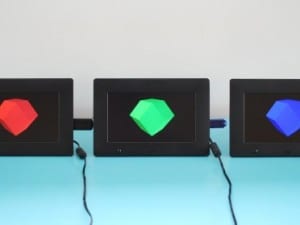Conflict has become a major part of our lives. Here in the UK, we have the choice to turn off the TV and adopt the “out of sight, out of mind” attitude, but it’s important that we remain switched on. On a recent UK tour, Al-Harah explored the impact of violence on everyday people’s lives.
For some people, Bethlehem is regarded as one of the most sacred places on earth. Every year, pilgrims flock there to discover the origins of the Nativity story. What is it like then, for a Palestinian born in Bethlehem today, living in a conflict zone? Al-Harah, a Palestinian theatre company in their recent production, Born in Bethlehem, explore the shocking reality of Palestinian life today sixty years after the formation of Israel.
The Al-Harah theatre company was established in January 2005 and was originally members of the INAD Theatre. Based in the West Bank town of Beit Jala near Bethlehem, Al-Harah means “the neighbourhood” and this name was chosen because it represents an intimate place full of people of all sexes, ages and backgrounds living together and where real events occur. Al-Harah has built a very strong bond with the community by producing shows for adults, young people and children. The company perform at any venue, whether it is in a remote refugee camp or a small village. They are also involved in community work and are working towards establishing the first Palestinian theatre college. Al-Harah have undertaken international tours, travelling everywhere from New York to Japan.
Born in Bethlehem is a play scripted by Al-Harah in English and directed by Sami Metwasi. Al-Harah have recently completed a UK tour bringing Born in Bethlehem to new audiences around the UK including: Leeds, Manchester, York, Plymouth, Great Torrington, Mold and London. This poignant drama takes the form of a guided tour through Bethlehem, complete with a tour guide and two actors playing the parts of Mary and Joseph enacting the journey from Nazareth to Bethelehem. The audience act as sightseers, but the two actors playing Mary and Joseph cannot explore the problems their characters faced without juxtaposing the problems that contemporary Palestinians face, including the dividing wall and persistent security checks. Catching up with Marina Barham, co-founder and General Director of Al-Harah Theatre, at York Theatre Royal before the show was enlightening. She comments: “Theatre is a very powerful tool to express our feelings and messages to the world. It is also the language of the West, so to get our voices heard, as Palestinians and Palestinian artists, we thought the theatre would be the most appropriate art form to use. This is why we chose to perform Born in Bethlehem, which is a play directed at international audiences.”
The idea for Born in Bethlehem originated from the personal diary that Marina kept during the second intifada between 2004 — 2006. This log of her daily experiences — what was happening with the theatre and her nieces and nephews — was sent to her friends around the world. It ended up being distributed worldwide with people everywhere from Italy, France and Japan reading it and being deeply affected by the contents. “We thought we could use some of the stories to create a show directed at tourists who come to Bethlehem, but when we started researching and meeting with travel agents we found that it would be very difficult to enter the tourism industry, as many of the tour programmes are controlled by the Israeli tourist offices.”
With the difficulties posed by the tourism industry, Al-Harah decided to focus on touring and reaching international audiences. They researched events that had happened in the Bethlehem area and focused on very human stories. Born in Bethlehem draws the audience into the world of the Palestinians utilising these real-life stories combined with music and images. “We collected stories of people who have experienced things that happen on a daily basis in Palestine. Many women that wanted to cross the checkpoint to go to the hospital to give birth, for example, lost their lives because they were not allowed through the checkpoint. The second story is one that we researched and is used for the character of the tour leader. His daughter who was 12 years old was in the car with him and his family in Bethlehem. Members of the Israeli military disguised as priests entered Bethlehem to detain a wanted person, but they opened fire on the car and the little girl, Christine, was killed. The tour leader refuses to talk about his daughter in Born in Bethlehem and is only interested in attracting tourists, so he insists on only performing the Nativity story, while the actors try and force him to speak about what happened. The third story is that of a young woman that has two children and during one of the curfews imposed on Beit Jala her children are hungry and needed milk. She disobeyed the curfew to go to the nearby shop to get the milk and a missile from a tank on the street killed her. We also talk about the wall and the process of passing through the wall.”
Born in Bethlehem uses a scenic minimalism, which is partly due to the conditions they have to work under in Palestine. The lack of free movement and no designated theatre space combined with the desire to reach as many people in different areas as possible. Born in Bethlehem addresses the dire human rights situation Palestinians face, with access strictly controlled by checkpoints and the Israeli military. Simple necessities such as water and freedom of movement become luxuries. “People don’t believe that what they see in the play is part of daily life for us. An older women came up to me after the performance in Manchester and said, ‘I thought I knew a little bit about Palestine, but I was shocked by what I saw in the play as it is not even a little of what I imagined.’ We want people to realise that not all deaths in Palestine are related to freedom fighting or resistance. There are people who are just going about their daily lives and they get killed by the conflict.” This lack of access affects Al-Harah’s work in Palestine, even though they are based in Beit Jala, a journey to Jerusalem, which is twenty minutes away. “Sometimes we go to a show and are so tired, because the night before we couldn’t sleep because there was bombing, or a house being demolished. Then in the morning we go to a school to perform, and we have to switch our mindset to being fun and happy. This is our duty to the children and our people.”
A key outcome of the recent UK tour was to help to educate people not only about the Palestinian situation, but also to show audiences that there is a thriving theatre and arts movement. “During the second intifada, there was a cultural revolution not only against the occupation, but within Palestinian society. People began to appreciate music, theatre and all kinds of art as a way of protesting against the violence. People realise that we cannot only reach the world by demonstrating by throwing stones, but we can reach the world by playing music and performing. The first time there was a march from Ramallah to the checkpoint, artists used music, poetry and dance and walked to the checkpoint. For twenty minutes the soldiers didn’t know what to do, or how to react, as it was the first time they had seen people use artistic expression to protest.”
Al-Harah is a brave representation of the search for justice for the Palestinian people. Even when facing harsh repression they seek to create a powerful and intense performance, which alerts the world to what is happening in Palestine and the lack of basic human rights, with Bethlehem and the Nativity story as the backdrop. “We would love for people from the UK to visit Palestine to meet the people and hear our stories, as well as to participate with the theatre to understand the reality. As Palestinians, we want efforts to be made for peace for both people.”
Shona Fairweather





